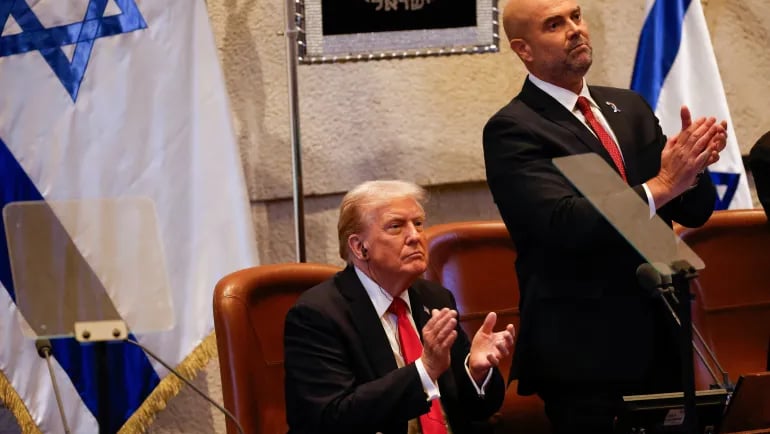GLOBISCOPE
Fact-Check: Donald Trump’s Claims in His Israeli Parliament Speech
WORLD
Globiscope
10/14/20253 min read


Jerusalem, October 14, 2025
During a high-profile speech at the Knesset, U.S. President Donald Trump hailed the recent Israel-Hamas ceasefire and prisoner exchange as a “historic dawn of a new Middle East.” However, several of his claims about the deal and other global peace initiatives don’t fully align with verified facts.
The address came on the same day Israel and Hamas carried out a major prisoner and detainee swap — the most significant step in the Gaza peace framework so far. Trump described the moment as “the end of an age of terror and death and the beginning of the age of faith and hope.”
Trump’s Gaza Deal and Middle East Peace Plan
Trump outlined his 20-point peace plan, which aims to establish long-term stability in Gaza. Under this initiative, an Arab-international stabilization force will deploy in Gaza, while local governance transitions from Hamas to a Palestinian administrative committee.
This body, according to the plan, will operate under the oversight of a “Board of Peace” chaired by Trump himself and joined by former UK Prime Minister Tony Blair.
Trump, who became the fourth U.S. president to address Israel’s parliament, praised his negotiator Steve Witkoff and Secretary of State Marco Rubio. He also urged Israeli President Isaac Herzog to pardon Prime Minister Benjamin Netanyahu, who continues to face long-standing corruption charges.
Fact-Checking Trump’s Key Statements
Claim 1: “I settled eight wars in eight months.”
Trump’s assertion of resolving eight international conflicts is greatly overstated.
While his administration facilitated several ceasefires — including between Israel and Iran, India and Pakistan, and Armenia and Azerbaijan — many of these truces were short-lived or minor diplomatic pauses rather than formal peace agreements.
Violence has persisted in places like Congo and Rwanda despite a U.S.-brokered truce in June. Similarly, tensions remain between Cambodia and Thailand, which both accuse each other of violating ceasefire terms. The Ethiopia-Egypt dispute over the Nile dam remains unresolved, and the Kosovo-Serbia conflict was never on the brink of open war.
While Trump played a key role in the Gaza ceasefire and prisoner release, his sweeping claim of ending eight wars is exaggerated.
Claim 2: “We dropped 14 bombs on Iran’s nuclear sites and obliterated them.”
There is no conclusive evidence to confirm Trump’s statement about the success of Operation Midnight Hammer, a U.S. strike on Iranian nuclear facilities in June 2025.
Independent intelligence assessments remain classified, and the Fordow nuclear site — one of the key targets — is believed to have sustained damage, but not complete destruction.
A New York Times analysis published in August suggested the strikes likely caused “significant structural damage,” but concluded that the extent of the impact remains uncertain. Therefore, Trump’s description of “total obliteration” is not substantiated.
Claim 3: “The Iran nuclear deal was a total disaster.”
Trump’s dismissal of the 2015 Joint Comprehensive Plan of Action (JCPOA) ignores important context.
Under that deal, Iran agreed to restrict its nuclear activities and submit to continuous monitoring by the International Atomic Energy Agency (IAEA) in exchange for sanctions relief.
Before Trump withdrew from the agreement in 2018, the IAEA had confirmed full Iranian compliance with only minor technical violations.
Experts have widely credited the JCPOA for delaying Iran’s nuclear ambitions, and the U.S. withdrawal led Tehran to resume higher levels of uranium enrichment. Thus, Trump’s characterization of the pact as a “disaster” contradicts expert assessments.
Claim 4: “Obama and Biden hated Israel.”
Trump accused former Presidents Barack Obama and Joe Biden of harboring “absolute hatred” toward Israel — a claim inconsistent with the record.
Despite occasional political friction with Prime Minister Netanyahu, both administrations maintained robust U.S.-Israel cooperation and military aid.
In 2016, Obama signed the largest military assistance package in U.S. history — a $38 billion, 10-year agreement — to modernize Israel’s defense systems. Under Biden, the U.S. has provided over $21 billion in military assistance since October 2023 and shielded Israel at the United Nations by blocking several ceasefire resolutions.
As historian Osamah Khalil noted, “There is no evidence of personal animosity. In fact, both administrations expanded U.S.-Israel coordination.”
Claim 5: “Obama and Biden did nothing with the Abraham Accords.”
Trump’s statement here is factually incorrect. The Abraham Accords, signed in 2020 during Trump’s first term, normalized relations between Israel and several Arab states — the UAE, Bahrain, Sudan, and Morocco.
President Obama left office in 2017, three years before the accords existed.
The Biden administration later attempted to expand the agreements to include Saudi Arabia, but the effort faltered following the October 7, 2023 Hamas-led attacks and Israel’s subsequent Gaza offensive.
According to political analyst Jeremy Pressman, the devastating Gaza war — which killed over 68,000 Palestinians, including tens of thousands of women and children — made normalization “politically untenable” for Riyadh.
Bottom Line
While Trump’s speech celebrated his role as a global peace broker, many of his claims either exaggerate his achievements or omit key context.
The Gaza ceasefire and prisoner exchange are indeed major diplomatic milestones, but the broader Middle East peace process remains fragile and far from complete.


Globiscopes news 2025
Globiscopes news empowers the generation of tomorrow for a brighter future and hope for every individual.
inbox
Subscribe to our newsletter and never miss a story.
We care about your data in our privacy policy.
